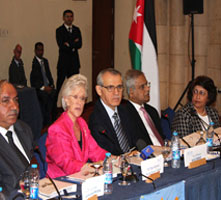“The key challenges pertain to the inadequate investment and low priority given to nursing education; lack of capacity in nursing schools in terms of the availability of educators and trainers, as well as infrastructure; the need to further update nursing curricula in order to bridge the service–education gap; the limited institutional capacity to offer post-basic training programmes; and inadequate emphasis on continuous professional development programmes,” says Dr Ala Alwan, WHO Regional Director for the Eastern Mediterranean.
HRH PRINCESS Muna Al-Hussein notes that the Eastern Mediterranean Region was one of the first regions to develop standards for pre-service nursing education, including prototype curricula for technical and professional levels of nursing. She has praised the tireless efforts of the Regional Advisory Panel on Nursing, established in 1990, and reiterated that the ultimate goal is to prepare competent nurses and midwives to meet national priority health needs in adequate numbers through accredited theoretical and clinical education and provide access to life-long learning.
The updated prototype curricula will integrate recent concepts related to emergency and disaster preparedness competencies and place greater emphasis on: noncommunicable diseases; patient safety; social determinants of health; primary health care; community mental health; information technology; infection prevention and control, including injection safety; disability and violence and injury prevention; and ageing.
As part of continuous endeavours to address nursing education, WHO is also organizing another consultation on developing a post-basic psychiatric nursing programme for countries in human resources for health crisis. “This meeting is of vital importance, especially in light of the severe shortage of a specialized health workforce in the area of mental health,” Dr Alwan said.
A review of the mental health component in undergraduate nursing training programmes in the Region revealed that only about 3% of the programme is devoted to mental health. In-service training on mental health is provided for more than 50% of primary care nurses in 10% of countries, and the median rates of nurses engaged in providing mental health care in countries of the Region is 3.6 nurses per 100 000 population.
Both consultations will be attended by members of the Regional Advisory Panel on Nursing, selected Deans of Nursing, experts in nursing, midwifery and psychiatric nursing education, representatives of regional WHO collaborating centres for nursing and the International Council of Nurses.









